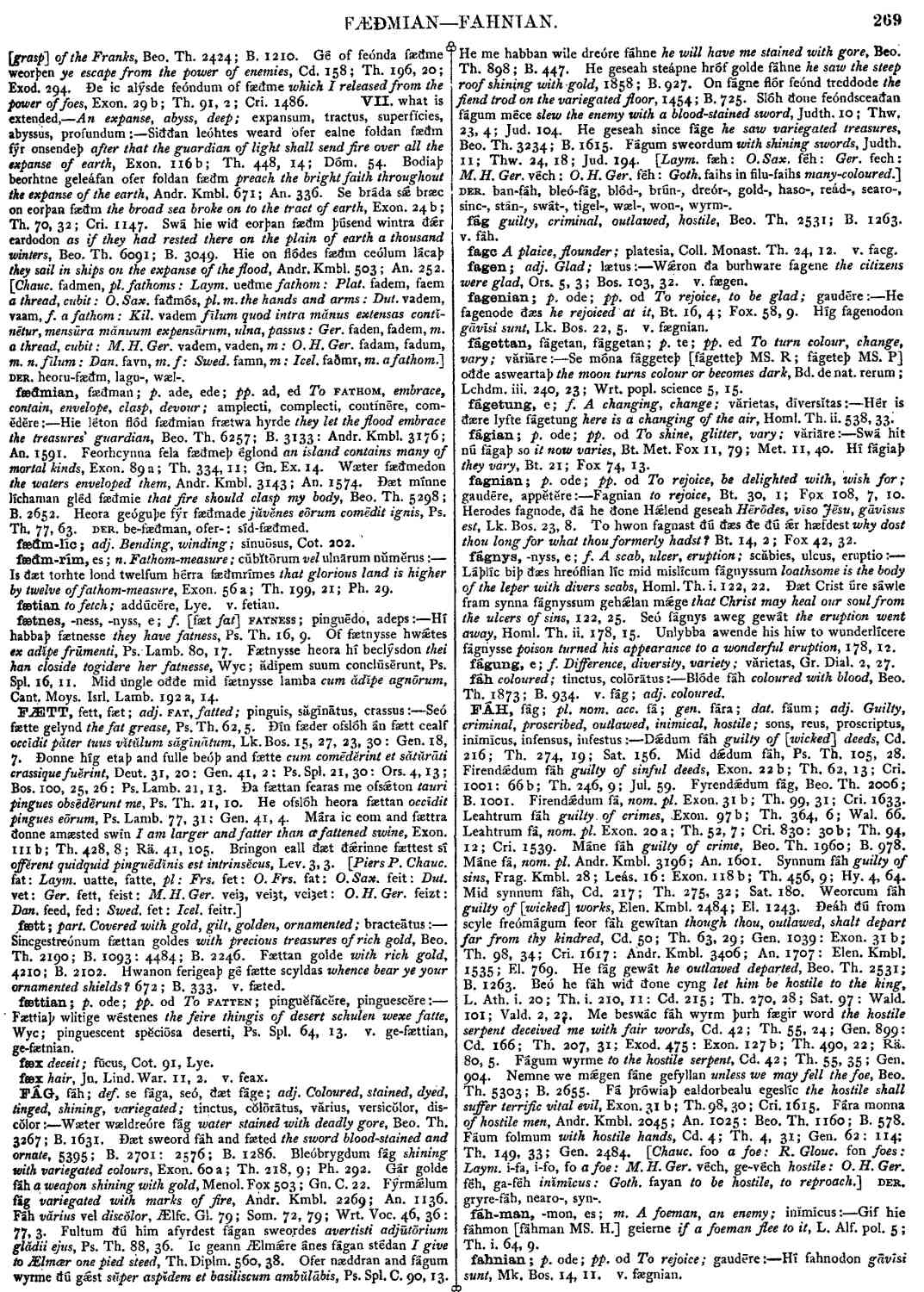FÁH
- adjective
-
Dǽdum fáh
guilty of [wicked] deeds,
- Cd. 216 ;
- Th. 274, 19;
- Sat. 156 .
-
Mid dǽdum fáh,
- Ps. Th. 105, 28.
-
Firendǽdum fáh
guilty of sinful deeds,
- Exon. 22 b ;
- Th. 62, 13;
- Cri. 1001: 66 b ;
- Th. 246, 9;
- Jul. 59 .
-
Fyrendǽdum fág, Beo. Th. 2006; B. 100l. Firendǽdum fá,
nom. pl.
- Exon. 31 b ;
- Th. 99, 31;
- Cri. 1633 .
-
Leahtrum fáh
guilty of crimes,
- Exon. 97 b ;
- Th. 364, 6;
- Wal. 66 .
-
Leahtrurn fá,
nom. pl.
- Exon. 20 a ;
- Th. 52, 7;
- Cri. 830: 30 b ;
- Th. 94. 12 ;
- Cri. 1539 .
-
Máne fáh
guilty of crime,
- Beo. Th. 1960 ;
- B. 978 .
-
Máne fá,
nom. pl.
- Andr. Kmbl. 3196 ;
- An. 1601 .
-
Synnum fáh
guilty of sins,
- Frag. Kmbl. 28 ;
- Leás. 16: Exon. 118 b ;
- Th. 456, 9;
- Hy. 4, 64.
-
Mid synnum fáh,
- Cd. 217 ;
- Th. 275, 32;
- Sat. 180 .
-
Weorcum fáh
guilty of [wicked] works,
- Elen. Kmbl. 2484 ;
- El. 1243 .
-
Ðeáh ðú from scyle freómágum feor fáh gewítan
though thou, outlawed, shalt depart far from thy kindred,
- Cd. 50 ;
- Th. 63, 29;
- Gen. 1039: Exon. 31 b ;
- Th. 98, 34;
- Cri. 1617: Andr. Kmbl. 3406 ;
- An. 1707: Elen. Kmbl. 1535 ;
- El. 769 .
-
He fág gewát
he outlawed departed,
- Beo. Th. 2531 ;
- B. 1263 .
-
Beó he fáh wið ðone cyng
let him be hostile to the king,
- L. Ath. i. 20 ;
- Th. i. 210, 11: Cd. 215 ;
- Th. 270, 28;
- Sat. 97 ;
- Wald. 101 ;
- Vald. 2, 22.
-
Me beswác fáh wyrm þurh fægir word
the hostile serpent deceived me with fair words,
- Cd. 42 ;
- Th. 55, 24;
- Gen. 899: Cd. 166 ;
- Th. 207, 31;
- Exod. 475: Exon. 127 b ;
- Th. 490, 22;
- Rä. 80, 5.
-
Fágum wyrme
to the hostile serpent,
- Cd. 42 ;
- Th. 55, 35;
- Gen. 904 .
-
Nemne we mǽgen fáne gefyllan
unless we may fell the foe,
- Beo. Th. 5303 ;
- B. 2655 .
-
Fá þrówiaþ ealdorbealu egeslíc
the hostile shall suffer terrific vital evil,
- Exon. 31 b ;
- Th. 98, 30;
- Cri. 1615 .
-
Fára monna
of hostile men,
- Andr. Kmbl. 2045 ;
- An. 1025: Beo. Th. 1160 ;
- B. 578 .
-
Fáum folmum
with hostile hands,
- Cd. 4 ;
- Th. 4, 31;
- Gen. 62: 114 ;
- Th. 149, 33;
- Gen. 2484 .
Bosworth, Joseph. “FÁH.” In An Anglo-Saxon Dictionary Online, edited by Thomas Northcote Toller, Christ Sean, and Ondřej Tichy. Prague: Faculty of Arts, Charles University, 2014. https://bosworthtoller.com/10079.
Checked: 1